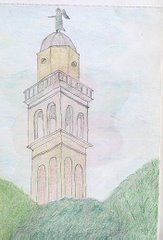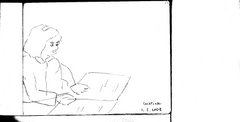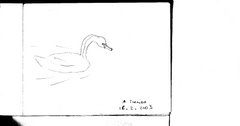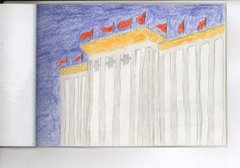Ricevuto da AAUP - Association of American University Professors - che denuncia gli arbitri e l'estrema insicurezza in cui lavora il personale delle università americane, in quanto i capi possono licenziare anche senza validi motivi.
Ne so qualcosa anch'io. Posso confermare che in USA si lavora benissimo da un lato - perchè strutture, biblioteche, computer ... tutto è molto efficiente e porta ad un lavoro molto intenso e entusiasmante - ma dall'altro in un clima di tensione e preoccupazione enormi perchè i capi possono sbatterti fuori con estrema arbitrarietà. Un piccolo errore può costarti il posto. Risultato? Io ho lavorato con grande entusiasmo con gli studenti; mi piaceva moltissimo insegnare e frequentare i corsi, ma mi sono allontanata sempre di più dal mio istituto, con cui alla fine non comunicavo neanche più, e dai capi che sono temuti come pericolosi tiranni.
BLUE BANNER
The AAUP Online
News for the Higher Education Community
This message celebrates an anniversary: a year ago the AAUP adopted its most detailed and specific set of recommended institutional regulations governing part-time faculty positions. That action followed upon an extensive series of AAUP reports about the changing state of faculty appointments. The reports themselves, the first appearing in 1980, were written in response to thirty years of gradually increasing use of contingent faculty throughout American higher education.
In 1975, tenured and tenure-track faculty together constituted 57 percent of faculty nationwide. By 2005, the latest year for which figures are available, that combined group had been whittled down to merely 32 percent. Contingent faculty had meanwhile grown from 43 percent to 68 percent of the professoriate. You can help us raise awareness of these dramatic changes by printing out a bar graph recording them (http://www.aaup.org/NR/rdonlyres/9218E731-A68E-4E98-A378-12251FFD3802/0/Facstatustrend7505.pdf) and putting it on your office door.
The term “contingent faculty” itself reflects our awareness that several groups of teachers—including part-timers, full-timers off the tenure-track, and graduate employees who teach well beyond the needs of their own training—endure overlapping forms of exploitation and present comparable risks to higher education. We have warned repeatedly that the excessive employment of faculty without job security would eventually undermine both academic freedom and shared governance. That time has arrived. When most faculty are at risk of summary dismissal, the freedom for faculty to speak forthrightly is diminished. And faculty control over the curriculum is also undercut.
Some faculties have organized in response and won enforceable limits to the use of contingent faculty. Others need our help.
The rules we adopted last year, section 13 of our Recommended Institutional Regulations (http://www.aaup.org/AAUP/pubsres/policydocs/contents/RIR.htm), for the first time lay out very specific procedures for part-time faculty appointments. They are constructed as a series of steps that come into play at various stages of employment, including advance notice of reappointment, due process for dismissal, comprehensive review of performance, and eventually expectation of continued employment.
Meanwhile, our Committee A on Academic Freedom and Tenure is giving increasing attention to all contingent faculty appointments and defending faculty who are mistreated. This year, in response to information received about possible violations of academic freedom involving full- and part-time contingent faculty, the committee staff has counseled dozens of faculty members, written letters to administrations, and launched one full investigation. In one recent instance, a faculty member in her first year of full-time teaching at a community college in the Midwest—an institution where no faculty have tenure—asked for our assistance when she was told her contract would not be renewed. She had been slated to head an academic program, but encountered criticism from the administration when she organized a benefit concert to establish a health care fund for part-time faculty. Since she was given no formal reason for her nonrenewal, its timing suggested a relation to the administration’s displeasure at the implication that part-timers there were poorly treated. Her only appeal was to a grievance committee appointed by the administration. Our staff wrote a strong letter suggesting that her academic freedom had been violated, after which the administration entered into discussions with the faculty member, and a settlement was reached. “I would have been completely lost without the AAUP,” she told us.
Cary Nelson
AAUP President
The AAUP Online is an electronic newsletter of the American Association of University Professors. For more information about the AAUP, visit http://lyris.eresources.com:81/t/1212757/1942950/470/0/
You are currently subscribed to aaup as: rbarazza@purdue.edu.
To unsubscribe, send a blank email to leave-1212757-1942950I@lists.aaup.org
barazza.roberta@gmail.com
via de' toschi (bologna)

capanna su un albero - san lazzaro di savena (bologna)

palazzo (ele)fantuzzi - bologna (particolare)

porta manin - udine

rosa

castello di udine

fiori viola e gialli

fiori arancio

fiori rosa

la sedia di manzano (udine)

cristina

cigno (treviso)

la dea khali

oristano

castello di collalto (susegana - treviso)

casa abbandonata

castello di ferrara

linearità

ramo sul sile (treviso)

carnevale 2003 (treviso)

castello lucheschi (colle umberto - treviso)

castello vescovile (vittorio veneto - treviso)

narcisi

gatto di botero (venezia)

notte buia e tempestosa

porto di trieste

villa sul sile (treviso)

papaveri

verdi colline

professoressa di un'università italiana

oca. joniskis (lituania)

mucca. joniskis (lituania)

capra. joniskis (lituania)

koper (slovenia)

canneto (slovenia)

scurcola marsicana (l'aquila)

drago. abbazia di san clemente a causaria (pescara)

lecce. arco di trionfo

fiore (treviso)

castello di avio (trento)

fiore giallo (montecarlo)

jardin japonaise (montecarlo)

fiore (valbonne - francia)

fiore (plascassier - francia)

fiore (basovizza - trieste)

mudanjiang (cina)

maschera (pechino)

palazzo del parlamento (pechino)

pechino

in ricordo di immigrati albanesi (trieste)

scoglio a miramare (trieste)

tamerici (marano lagunare)

stallio e ollio

comignolo sul mare (trieste)

chopin (varsavia)

girasoli nel polesine

tallin (estonia)

paesaggio baltico

danzica (polonia). monumento a solidarnosc

varsavia.palazzo della cultura

architetture baltiche

klaipeda (lituania). nave

riga. particolare liberty

lettonia. comignoli

lettonia. albero

'Le tre grazie' di Riga (Lettonia).

riga. pop art baltica

udine.aereo

paperino

riga (lettonia). lume

riga (lettonia). geometrie

siauliai (lituania). chiesa ortodossa

il sentiero di rilke (duino - trieste). fiore

I miei siti e blog
Blog Archive
-
▼
2007
(129)
-
▼
October
(10)
- italiani bamboccioni?
- 'schiava di mio marito' di tehmina durrani. recens...
- stampa pro birmania
- società italiana maschilista? è un eufemismo
- il mio sostegno a AAUP che denuncia gli arbitri de...
- de magistris
- elefantiasi all'italiana
- please, slow down, siamo in Italia
- brogli elettorali nei seggi per il welfare
- ancora su abusi di potere in USA
-
▼
October
(10)
About Me
qualche mio articolo
- http://ilrestodelcarlino.ilsole24ore.com/rovigo/cronaca/2010/02/03/288495-canaro.shtml
- http://venus.unive.it/italslab/modules.php?op=modload&name=ezcms&file=index&menu=79&page_id=551
- http://ilmiolibro.kataweb.it/categorie.asp?searchInput=roberta+barazza&act=ricerca&genere=tutte
- http://www.luigiboschi.it/?q=search/node/roberta+barazza
- http://www.luigiboschi.it/?q=node/6902
- http://gruppoculturaleparolesparse.blogspot.com/2007/12/e-se-per-una-volta-parlassimo-di-film.html
- http://gruppoculturaleparolesparse.blogspot.com/2007/12/schiava-di-mio-marito-di-thmina-durrani.html
- http://www.ildueblog.it/?s=roberta+barazza
- http://www.peacereporter.net/default_ricerca.php?campo_ricerca=roberta+barazza
- http://venus.unive.it/italslab/modules.php?op=modload&name=ezcms&file=index&menu=79&page_id=176
- http://venus.unive.it/italslab/modules.php?op=modload&name=ezcms&file=index&menu=79&page_id=178
- http://venus.unive.it/italslab/modules.php?op=modload&name=ezcms&file=index&menu=79&page_id=243
- http://venus.unive.it/italslab/modules.php?op=modload&name=ezcms&file=index&menu=79&page_id=327
- http://venus.unive.it/italslab/modules.php?op=modload&name=ezcms&file=index&menu=79&page_id=368